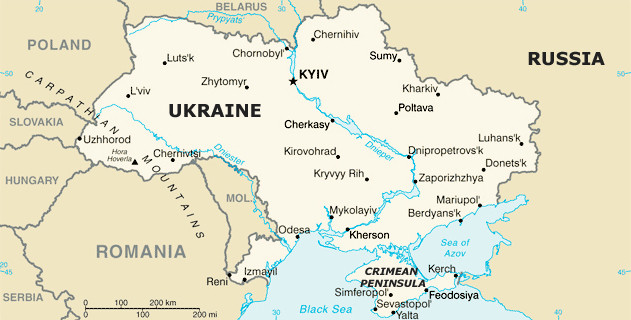Donbas Development: Will ‘Advisory Council’ Unlock Door To Direct Talks Between Kyiv And Russia-Backed Separatists?

(Article text ©2020 RFE/RL, Inc., Radio Free Europe/Radio Liberty – rferl.org – Tony Wesolowsky – March 30, 2020 – article text also appeared at rferl.org/a/ukraine-peace-advisory-council-direct-talks-kyiv-separatists-russia-backed/30518279.html)
No talks with Russia-backed separatists in eastern Ukraine: That has been a mantra for leaders in Kyiv throughout the six-year war that has killed more than 13,000 people in the Donbas and displaced more than 1 million.
Now, that may be changing.
In talks in Minsk on March 11, a tentative deal was struck that would give the separatists in Donbas a voice in the negotiating process established under the largely unimplemented cease-fire and settlement accords signed in the Belarusian capital in 2014 and 2015.
It is unclear whether the plans set out that day in March will be implemented. There is angry pushback from opponents of Ukrainian President Volodymyr Zelenskiy — and even from some of his allies: Several members of his Servant of the People party, which holds a majority in parliament, voiced concern over the proposal.
And it wasn’t the only new idea that was floated in Minsk. Another platform would promote “dialogue,” not only on the Donbas but also on Crimea, which Russia seized a month before the war in the Donbas started, as well as other potential problem spots in Ukraine, including western Ukrainian areas where ethnic Hungarians are seeking a stronger voice.
Another factor is the fast-moving coronavirus crisis: A follow-up meeting scheduled for March 25 was postponed amid concerns over the COVID-19 pandemic.
RFE/RL takes a look at what happened in Minsk on March 11, and what it may mean for the future of Ukraine, Russia, and the only war in Europe.
New Negotiators
Mediated by the Organization for Security and Cooperation in Europe (OSCE), two new figures took part in the meeting of what is formally known as the Trilateral Contact Group (TCG): Andriy Yermak, Zelenskiy’s new chief of staff, and Dmitry Kozak, Russian President Vladimir Putin’s new point man on Ukraine.
Yermak, a former film producer, raised his profile by playing a key role in a major prisoner swap between Ukraine and Russia late last year. But his appointment on February 11 raised eyebrows in Ukraine among those who feared it could signal a softening of the government’s stance on Russia.
Kozak, a deputy head of Putin’s administration, was also appointed on February 11.
He replaced Vladislav Surkov, a long-influential Kremlin insider who made waves with highly provocative comments about Ukraine shortly after his departure.
The main thing to come out of the meeting was the proposed creation of an Advisory Council with seats allotted to “authorized representatives” of the Russia-backed separatists.
While Moscow spoke of a breakthrough, Kyiv was mostly mute on what had transpired until Ukrainian media broke the silence by publishing the “protocol” agreed in Minsk.
The Council
According to the protocol, the Advisory Council would include 10 representatives of Ukraine and 10 representatives of the Russia-backed forces that hold parts of the Donetsk and Luhansk regions. Joining them would be a member each from Russia, Germany, France, and the OSCE. According to the text agreed in Minsk, the main purpose of the Advisory Council would be “to conduct and develop proposals for political and legal solutions towards the settlement of the conflict.”
The Controversy
Ukraine has long considered the leaders of the separatist forces as puppets of Moscow — some of them have been Russian citizens — and had ruled out talks with them.
After the Minsk meeting, Yermak denied that any concessions had been made.
“We have pledged to pursue agreement on several issues, most notably constitutional reform in the area of decentralization and local elections, with representatives of particular parts of the Donetsk and Luhansk regions of Ukraine” — official wording for the areas outside government control, sometimes known by the acronym ORDLO — within the Tripartite Contact Group.
“No direct talks – no question about it! We are talking about creating a platform where citizens of Ukraine, who live today in both controlled and uncontrolled territories, can communicate,” Yermak said.
This assurance was met by skepticism by opponents of any talks involving the Russia-backed separatists. To those Ukrainians, “It’s not important who exactly will represent the ORDLO: whether they are Putin’s men or not, whether they are fighters or not, whether they are in uniform or not,” said Maria Kucherenko, an analyst at the Kyiv-based Center for Civil Society Studies.
“The problem is that by announcing that there will be some type of council with the participation of the ORDLO within the Tripartite Contact Group, [officials have gone] against the logic of what the Tripartite Contact Group is: Russia, Ukraine, and the OSCE,” she said.
Another Platform?
The proposed Advisory Council was in the spotlight, but another new idea apparently emerged from the March 11 meeting in Minsk: Another potential space for dialogue with Donbas would be offered through a National Platform for Reconciliation and Unity.
Serhiy Syvokho, an adviser to the secretary of Ukraine’s National Security and Defense Council, said that, in addition to the Donbas and Russian-controlled Crimea, Ukraine faced tensions elsewhere, including in parts of the west where ethnic Hungarians have voiced frustration especially over language rights. He said that, elsewhere, amber miners have largely taken the law into their own hands.
When Syvokho was due to unveil the proposal to the public in Kyiv on March 12, he was greeted by furious nationalists, some of whom threw the former comic to the ground.
Ukrainian police said 15 people were arrested on March 12, some of whom were identified as members of National Corps, a nationalist group founded by Andriy Biletskiy, who established the controversial Azov volunteer battalion at the start of the conflict with Russia-backed separatists in 2014.
